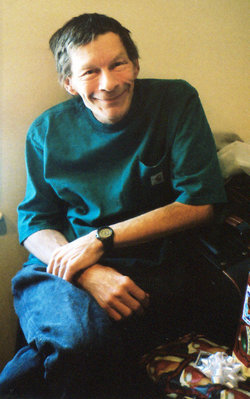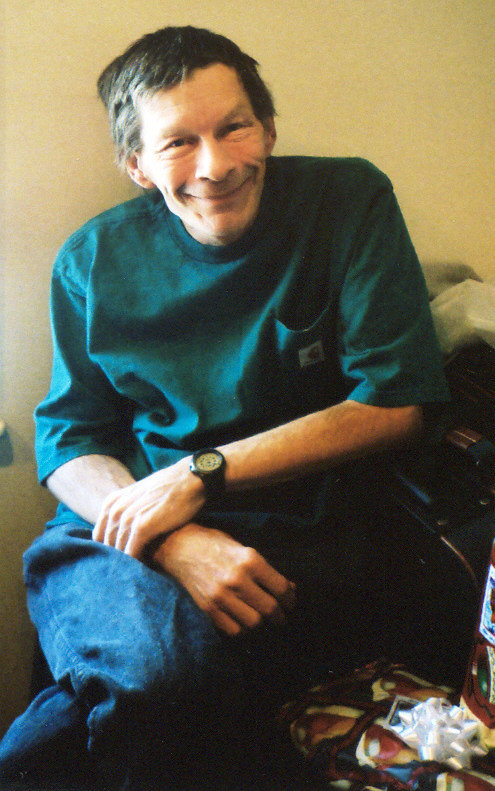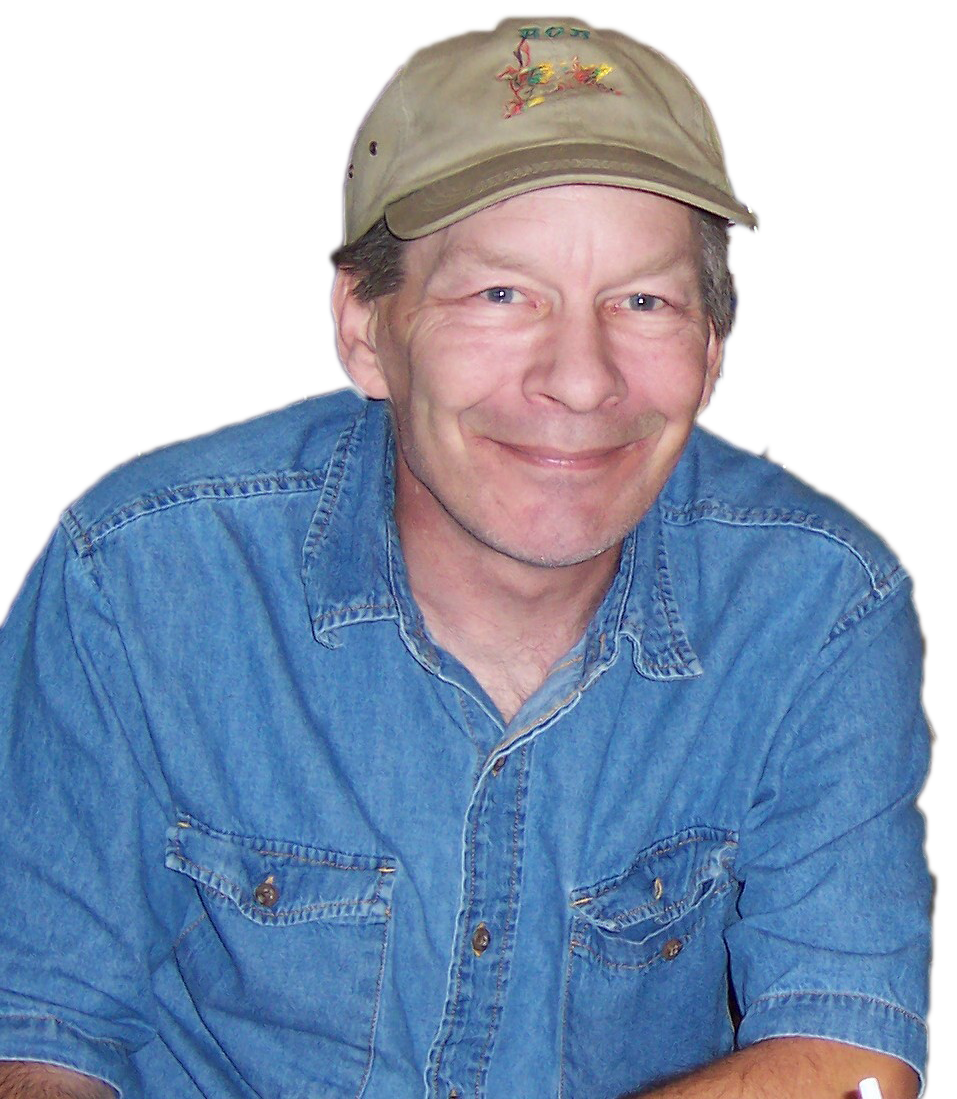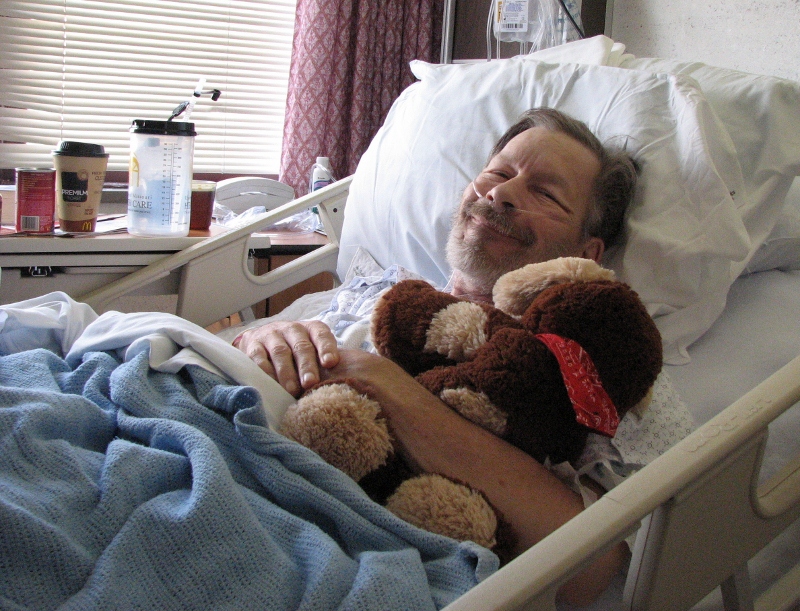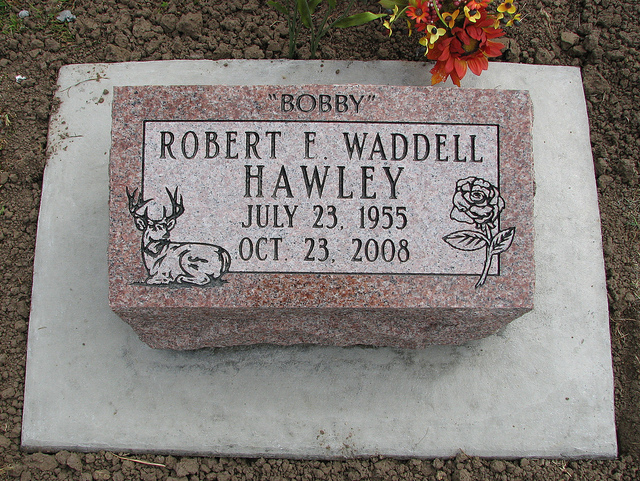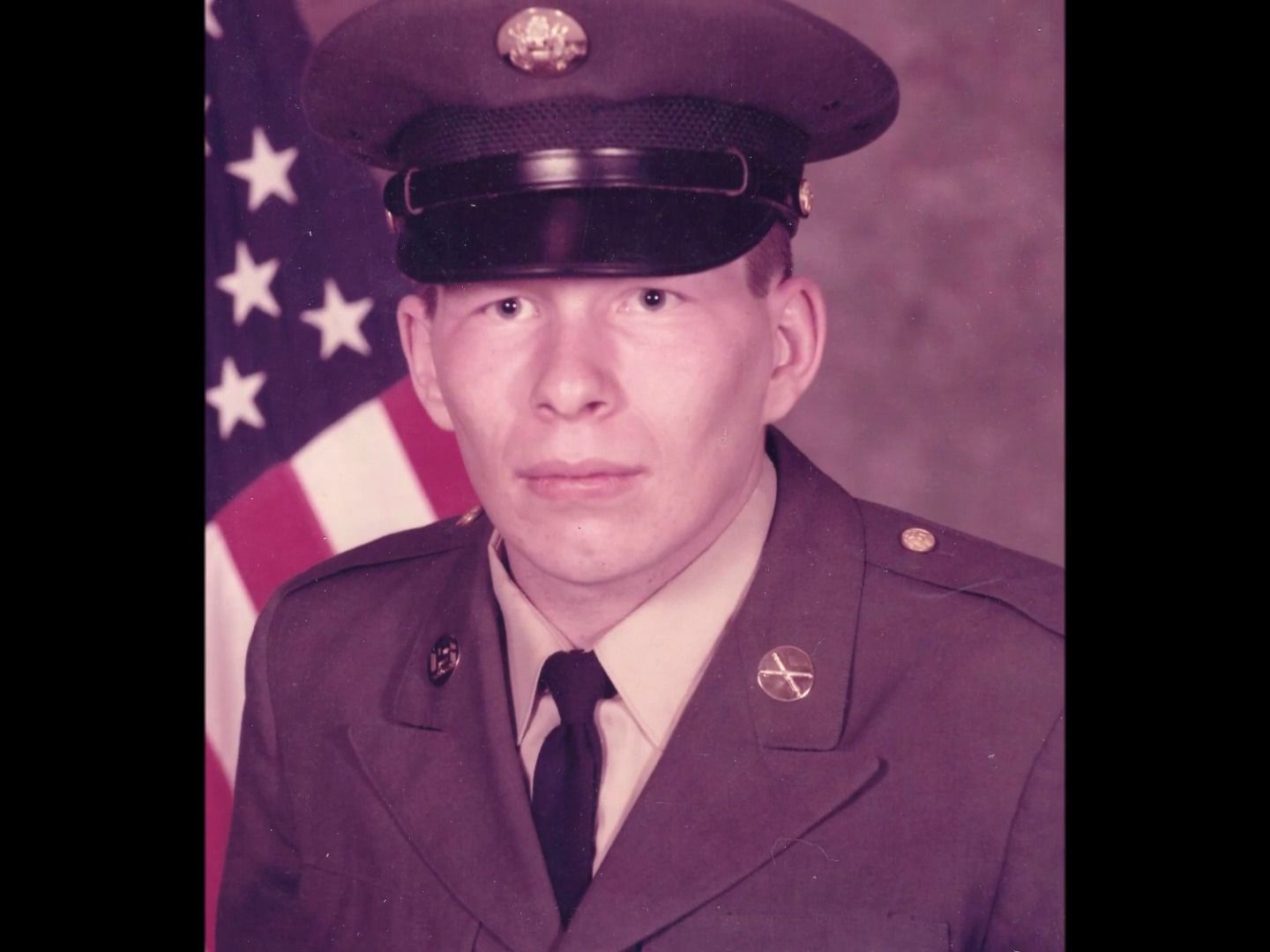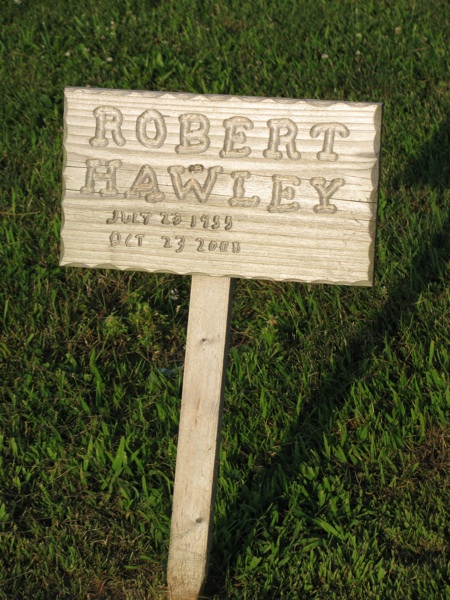Bob was a "blue baby" when he was born, lacking oxygen. He then had a complete blood transfusion because his parent's blood was incompatible. Then, as a toddler in a stroller, he was run over by a truck; the landlord of a farm his parents rented didn't see him in the driveway. He later was hospitalized for eating lead paint -- all before the age of three.
Bobby followed sister Jody to school when she started kindergarten and was often discovered and sent home, but he'd creep back. Ironically, he had dyslexia and he had great trouble in school when it was his turn to go, though that wasn't a known disability or diagnosed at the time. He was taken to Chicago's Children's Hospital in junior high school and diagnosed with "minimal brain damage" and left largely to fend for himself, mainstreamed in school.
Bobby was a constant wanderer; he'd follow the creek in the backyard to wherever it went, wandering off to chase crawdads or frogs. Bobby wasn't afraid of many things, critter wise, but he was afraid of needles and shots. He was so afraid of needles that when he had to have his teeth capped (they put him in the hospital for that) as a young child, his sister Jody was put in the hospital, too, to share a room with him. Their mom decided it might be a good idea for her to have her tonsils out because in this manner, he could be reassured about having his blood drawn for the surgery.
Bobby most enjoyed music -- laying on his bed and listening to head phones. His interests were always simple: hunting, fishing, leather crafting and just being in the woods. He has trapped raccoons and lived with his birth father in the woods, and traveled from state to state. He had a brief stint in the military, leaving after they made him repeat a mustard gas experience; the two parted company with an honorable discharge and a certainty of what he did not like and boundaries he would not cross.
Bob married Martha Smith in Iowa, and Joshua, his son, was born. Bob stayed with Martha and her two girls, but it didn't last long before he moved back to Denver. Bob went between siblings and parents off and on most of his adult life, until he settled in with his mom before she was diagnosed with cancer. Then, he became her caregiver, and he took care of his mother and all of her records and appointments during chemotherapy and after, until her death at home, which left him deeply traumatized. Then he went to Illinois and lived by his Uncle Gene and Aunt Sherrill Webster. She was like a second mother to him, and Gene like a surrogate father as well as uncle, as all of Bobby's father figures had died. Bobby most enjoyed wood carving classes and suppers with Gene -- a cup of coffee and sometimes pie. Gene literally saved Bobby's life more than once when Bobby went into a diabetic crisis.
After Aunt Sherrill died, Bobby moved to Missouri to be closer to the single other adult male in his life, his brother, Kurt Shryack. They spent a lot of time together after that, and Kurt became his caregiver in many ways, helping Bob through medical crisis and emotional problems. And Bobby helped Kurt in turn, offering glimpses of his life that perhaps no one else had seen.
Bob had developed needle-dependent diabetes in his thirties. He had many subsequent problems, including (in his 50s) diabetic comas, strokes, heart failure and kidney failure, resulting in dialysis. Kurt moved in with him and became his caretaker for the last few months of his life, after Bobby was found frozen in a field and "thawed" -- and then institutionalized for almost three months to stabilize him. They were home together from July - October 2008, and Kurt took him to dialysis and all of his appointments, cooked for him, and kept his blood sugar as stable as possible. Most of all, he was a reassuring presence. The freezing incident became a magnet for family; Bob's sister Jody made trips to Missouri to be with him, and he was accompanied by Kurt and Jody for his first dialysis treatment. The siblings all had some of their best adult times together, ironically, as Bobby moved from crisis to crisis.
Bob's greatest loves remained fishing and bow hunting -- reading about it in magazines when he could no longer physically go into the woods -- and also he loved watching a few favorite televisions programs with his brother and listening to old rock music. He loved his cat Mojo and his family. He died in the presence of his brother, Kurt.
Bobby was a simple man, with simple interests, but he was oftentimes amazingly witty and insightful. For all of his medical problems and challenges and institutionalizations, he bore those problems with admirable courage and fortitude, wanting only to be home when he died, and to rest next to his mother. He always spoke of Uncle Gene with deep affection and respect, and the carved staff that Uncle Gene made for him was in bed with him when he died, to help him on his journey. Gene hand carved the box in which Bobby's ashes were buried.
The words that bring his family comfort now were written by Dr. Seuss: "Do not cry because it's over. Smile because it happened." Bobby gave us all many reasons to smile.
Bob was a "blue baby" when he was born, lacking oxygen. He then had a complete blood transfusion because his parent's blood was incompatible. Then, as a toddler in a stroller, he was run over by a truck; the landlord of a farm his parents rented didn't see him in the driveway. He later was hospitalized for eating lead paint -- all before the age of three.
Bobby followed sister Jody to school when she started kindergarten and was often discovered and sent home, but he'd creep back. Ironically, he had dyslexia and he had great trouble in school when it was his turn to go, though that wasn't a known disability or diagnosed at the time. He was taken to Chicago's Children's Hospital in junior high school and diagnosed with "minimal brain damage" and left largely to fend for himself, mainstreamed in school.
Bobby was a constant wanderer; he'd follow the creek in the backyard to wherever it went, wandering off to chase crawdads or frogs. Bobby wasn't afraid of many things, critter wise, but he was afraid of needles and shots. He was so afraid of needles that when he had to have his teeth capped (they put him in the hospital for that) as a young child, his sister Jody was put in the hospital, too, to share a room with him. Their mom decided it might be a good idea for her to have her tonsils out because in this manner, he could be reassured about having his blood drawn for the surgery.
Bobby most enjoyed music -- laying on his bed and listening to head phones. His interests were always simple: hunting, fishing, leather crafting and just being in the woods. He has trapped raccoons and lived with his birth father in the woods, and traveled from state to state. He had a brief stint in the military, leaving after they made him repeat a mustard gas experience; the two parted company with an honorable discharge and a certainty of what he did not like and boundaries he would not cross.
Bob married Martha Smith in Iowa, and Joshua, his son, was born. Bob stayed with Martha and her two girls, but it didn't last long before he moved back to Denver. Bob went between siblings and parents off and on most of his adult life, until he settled in with his mom before she was diagnosed with cancer. Then, he became her caregiver, and he took care of his mother and all of her records and appointments during chemotherapy and after, until her death at home, which left him deeply traumatized. Then he went to Illinois and lived by his Uncle Gene and Aunt Sherrill Webster. She was like a second mother to him, and Gene like a surrogate father as well as uncle, as all of Bobby's father figures had died. Bobby most enjoyed wood carving classes and suppers with Gene -- a cup of coffee and sometimes pie. Gene literally saved Bobby's life more than once when Bobby went into a diabetic crisis.
After Aunt Sherrill died, Bobby moved to Missouri to be closer to the single other adult male in his life, his brother, Kurt Shryack. They spent a lot of time together after that, and Kurt became his caregiver in many ways, helping Bob through medical crisis and emotional problems. And Bobby helped Kurt in turn, offering glimpses of his life that perhaps no one else had seen.
Bob had developed needle-dependent diabetes in his thirties. He had many subsequent problems, including (in his 50s) diabetic comas, strokes, heart failure and kidney failure, resulting in dialysis. Kurt moved in with him and became his caretaker for the last few months of his life, after Bobby was found frozen in a field and "thawed" -- and then institutionalized for almost three months to stabilize him. They were home together from July - October 2008, and Kurt took him to dialysis and all of his appointments, cooked for him, and kept his blood sugar as stable as possible. Most of all, he was a reassuring presence. The freezing incident became a magnet for family; Bob's sister Jody made trips to Missouri to be with him, and he was accompanied by Kurt and Jody for his first dialysis treatment. The siblings all had some of their best adult times together, ironically, as Bobby moved from crisis to crisis.
Bob's greatest loves remained fishing and bow hunting -- reading about it in magazines when he could no longer physically go into the woods -- and also he loved watching a few favorite televisions programs with his brother and listening to old rock music. He loved his cat Mojo and his family. He died in the presence of his brother, Kurt.
Bobby was a simple man, with simple interests, but he was oftentimes amazingly witty and insightful. For all of his medical problems and challenges and institutionalizations, he bore those problems with admirable courage and fortitude, wanting only to be home when he died, and to rest next to his mother. He always spoke of Uncle Gene with deep affection and respect, and the carved staff that Uncle Gene made for him was in bed with him when he died, to help him on his journey. Gene hand carved the box in which Bobby's ashes were buried.
The words that bring his family comfort now were written by Dr. Seuss: "Do not cry because it's over. Smile because it happened." Bobby gave us all many reasons to smile.
